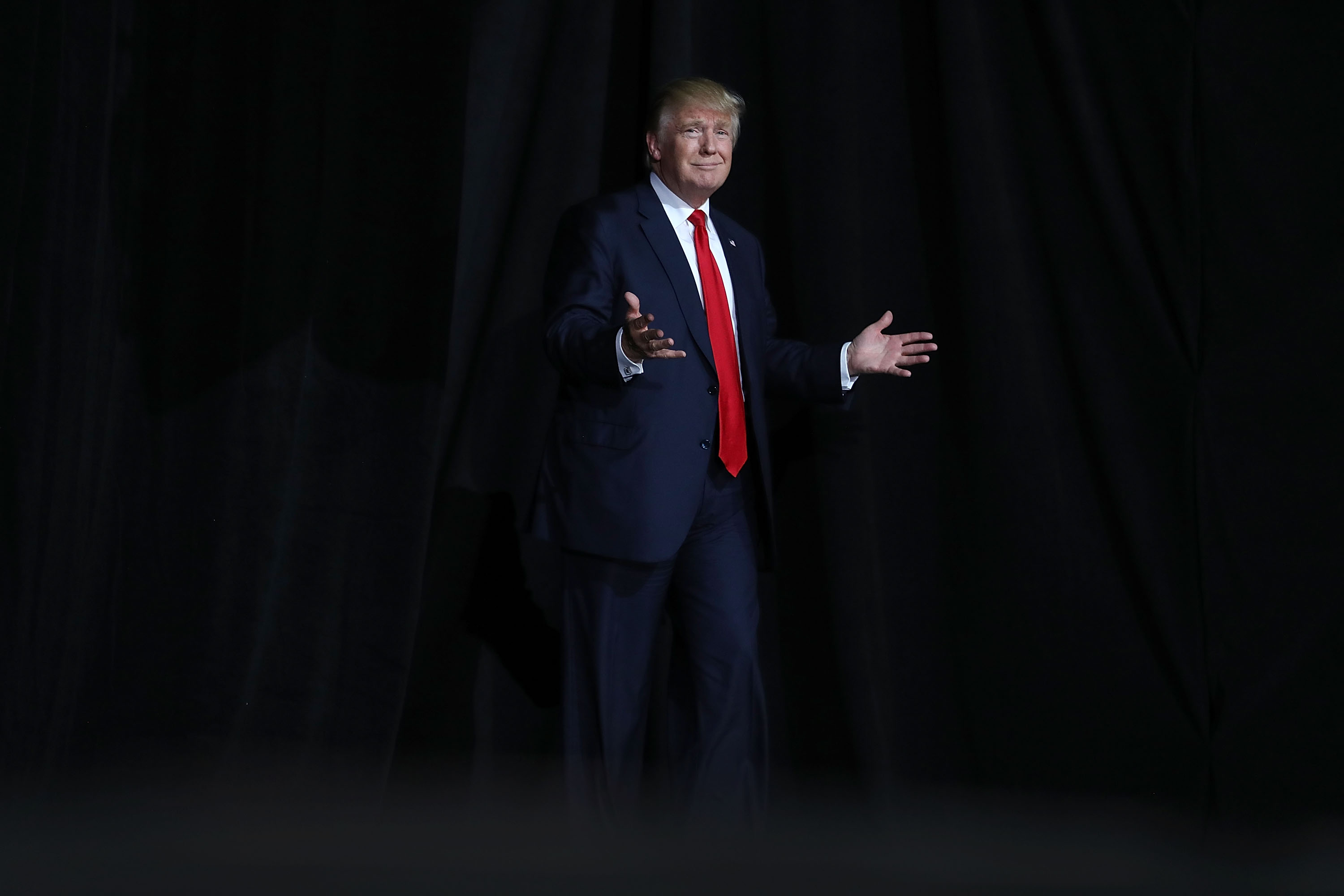President squish
Is Trump finally evolving into a northeastern moderate? Don't hold your breath ...


A free daily email with the biggest news stories of the day – and the best features from TheWeek.com
You are now subscribed
Your newsletter sign-up was successful
Is President Trump finally fulfilling his destiny as a northeastern Republican squish?
It's true that notwithstanding his many heresies throughout the 2016 campaign and even into his presidency, Trump has governed like a down-the-line conservative Republican 99 percent of the time. Still, there is something to his surprising short-term budget deal with Democratic leaders Chuck Schumer and Nancy Pelosi that exposes something essential about Trump: Up until about five minutes ago before he discovered that birtherism was a handy tool for gaining notoriety — the political equivalent of tabloid schlock — Trump was a Republican squish.
Not a moderate, not an independent, not a centrist. These are terms of art, akin to empty "spiritual but not religious" phraseology, employed by elite media to describe themselves and their soi disant purple ideology. Squish, on the other hand, is a term anyone who worked on Capitol Hill in the 1990s, as either a staffer, a lobbyist, or a think-tanker, will remember well. After the '94 Gingrich revolution, movement conservatives came to dominate the House of Representatives but not the Senate. Even in the House, for a time, there was a not inconsiderable lot of Republicans like Chris Shays of Connecticut, Jim Leach of Iowa, and Tom Campbell of California (the last GOPer to represent Silicon Valley) who would buck the Gingrich-DeLay regime.
The Week
Escape your echo chamber. Get the facts behind the news, plus analysis from multiple perspectives.

Sign up for The Week's Free Newsletters
From our morning news briefing to a weekly Good News Newsletter, get the best of The Week delivered directly to your inbox.
From our morning news briefing to a weekly Good News Newsletter, get the best of The Week delivered directly to your inbox.
They were not simply "fiscally conservative but socially moderate," as today's vogue would have it; they were squishy across the board, on fiscal and social issues alike. At the same time, the most ardently socially conservative members of the Gingrich wing were also the most fiscally conservative (think Rep. Mike Pence of Indiana) — a phenomenon I have attributed to the fecund subculture of "Christian economics," which led to the Tea Party movement, with its fiscal veneer and religious core.
Until he rebooted his political career during the Obama administration, Donald Trump fit comfortably in the universe of the Republican squish.
Here is Scott McConnell of The American Conservative elaborating on the theme in February 2016:
The liberal media (reinforced by the voices of [the] Republican establishment) has been so busy seeking reasons to display shock and horror at Trump's rise that they have largely missed that he is essentially a moderate Republican. Trump is relatively tough on the one issue that simply did not exist in the era of Rockefeller, Nixon, and Ford: mass immigration. Apart from that, he is politically of a piece with the latter three — supporter of substantial public works, not eager to take a knife to New Deal era entitlements, a law-and-order guy but certainly ready to accommodate both minority political aspiration and affirmative action. [The American Conservative]
And here is Trump himself, in a 1988 interview with Larry King, replying, "You could say that" to King's characterization of Trump as an "eastern Republican":
A free daily email with the biggest news stories of the day – and the best features from TheWeek.com
(Note, too, Trump's now-familiar affinity for the "the people who drive the taxis," as opposed to the wealthy, who "don't like me.")
None of this is to claim that I can discern Trump's true essence, or that the bigotry and ethnonationalism was just a pose to beat an Electoral College path to the White House. Unlike Scott McConnell, I am shocked and horrified by Trump. I think that he very probably is a bigot — at best a sort of Southern plantation grandee who mistakes his racialism for benign paternalism. It's not to dispute, either, Slate's Jamelle Bouie when he writes that "Trump is the leader of the party, and by virtue of this is inextricably tied to the party infrastructure. Every choice he makes, from proposals and policies to the people he nominates and appoints, is drawn from a well constructed by the Republican Party and built to its specifications. Trump might not be a product of the party, but the same can't be said of his White House."
It is, rather, to view the Trump presidency through the "Five Scenarios" lens I crafted shortly after he won the presidency. He would govern, I predicted, as his old Northeastern Republican self; as a passive vessel for the Paul Ryan agenda; as true-blue Bannonite ethnonationalist; as a "people pleaser," lurching this way and that with his finger to the wind; or, merely and tragically, as an "agent of chaos" who combines elements of each of the preceding four scenarios.
For the first eight months of the Trump presidency, he has amazingly tried and failed to please both Paul Ryan and Stephen Bannon. He couldn't build a wall or repeal and replace ObamaCare. His neo-American system, where manufacturers and unions alike grovel before his beneficent public works-erecting hand, has dissolved in a flash. And the result, generally, has been chaos. What we had yet to see is the squishy Northeastern and the people-pleaser. Until, that is, the Chuck-and-Nancy deal, after which Trump was reported to have been basking in the glow of positive press notices.
Trump will almost certainly revert to helping Paul Ryan cut taxes on the wealthy this fall. He will continue to reshape the federal bench in a way that makes the Federalist Society blush with pride. All that happened last week is that an old character has finally joined the teeming tableau of the Trump presidency.
Welcome to the party!
Scott Galupo is a freelance writer living in Virginia. In addition to The Week, he blogs for U.S. News and reviews live music for The Washington Post. He was formerly a senior contributor to the American Conservative and staff writer for The Washington Times. He was also an aide to Rep. John Boehner. He lives with his wife and two children and writes about politics to support his guitar habit.
-
 Switzerland could vote to cap its population
Switzerland could vote to cap its populationUnder the Radar Swiss People’s Party proposes referendum on radical anti-immigration measure to limit residents to 10 million
-
 Political cartoons for February 15
Political cartoons for February 15Cartoons Sunday's political cartoons include political ventriloquism, Europe in the middle, and more
-
 The broken water companies failing England and Wales
The broken water companies failing England and WalesExplainer With rising bills, deteriorating river health and a lack of investment, regulators face an uphill battle to stabilise the industry
-
 The billionaires’ wealth tax: a catastrophe for California?
The billionaires’ wealth tax: a catastrophe for California?Talking Point Peter Thiel and Larry Page preparing to change state residency
-
 Bari Weiss’ ‘60 Minutes’ scandal is about more than one report
Bari Weiss’ ‘60 Minutes’ scandal is about more than one reportIN THE SPOTLIGHT By blocking an approved segment on a controversial prison holding US deportees in El Salvador, the editor-in-chief of CBS News has become the main story
-
 Has Zohran Mamdani shown the Democrats how to win again?
Has Zohran Mamdani shown the Democrats how to win again?Today’s Big Question New York City mayoral election touted as victory for left-wing populists but moderate centrist wins elsewhere present more complex path for Democratic Party
-
 Millions turn out for anti-Trump ‘No Kings’ rallies
Millions turn out for anti-Trump ‘No Kings’ ralliesSpeed Read An estimated 7 million people participated, 2 million more than at the first ‘No Kings’ protest in June
-
 Ghislaine Maxwell: angling for a Trump pardon
Ghislaine Maxwell: angling for a Trump pardonTalking Point Convicted sex trafficker's testimony could shed new light on president's links to Jeffrey Epstein
-
 The last words and final moments of 40 presidents
The last words and final moments of 40 presidentsThe Explainer Some are eloquent quotes worthy of the holders of the highest office in the nation, and others... aren't
-
 The JFK files: the truth at last?
The JFK files: the truth at last?In The Spotlight More than 64,000 previously classified documents relating the 1963 assassination of John F. Kennedy have been released by the Trump administration
-
 'Seriously, not literally': how should the world take Donald Trump?
'Seriously, not literally': how should the world take Donald Trump?Today's big question White House rhetoric and reality look likely to become increasingly blurred
